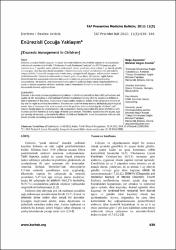Enürezisli çocuğa yaklaşım
Özet
Enürezis, çocuğun benlik saygısını ve yaşam kalitesini etkileyen ve çocukluk çağının en sık karşılaşılan psikososyal sorunlarından biridir. Uluslararası Çocuk Kontinans Cemiyeti’nin (ICCS) tanımına göre, enürezis en az 5 yaşından sonra, istemsiz ya da amaçlı olarak, yineleyici, en az ardışık 3 ay süreyle gündüz ve/veya gece idrar kaçırma olarak tanımlanır. Enürezis biyolojik, sosyal ve psikolojik pek çok nedenle ortaya çıkabilir. Enürezisli çocuğun tedavisinde amaç, çocuğun benlik duygusu zedelenmeden sorunun çözümlenmesidir. Enürezisin tedavisinde en önemli görev aileye düşer. Hemşireler, sağlık bakım hizmetlerinin her aşamasında enürezisi olan çocuk ve ailesinin gereksinimlerini karşılamaktan sorumludurlar. Bu nedenle, enürezisin nedenlerini, tipini ve şiddetini doğru olarak değerlendirebilmeli, çocuk ve ailenin yaşamına etkilerini anlamalı, tedavi yöntemlerini bilmeli ve bu konuda ailelere danışmanlık hizmeti sağlamalıdırlar. Enuresis is the most common psychosocial problems in childhood and affects the child's self-esteem and quality of life. According to International Children's Continence Society (ICCS), enuresis is defined as after a minimum of five years, involuntary or purposeful, repetitive, at least three consecutive months of day and /or night as urinary incontinence. Enuresis can occur for many reasons; biological, psychological, social. Aim of treatment child with enuresis solve the problem without disturbing the children's self esteem. Family takes the most important role at treatment. Nurses responsible the needs of children with enuresis and their families at every stage of health care services. Therefore, nurses know the causes, type and severity of enuresis, understand the effects of child and family life, know the treatment methods and should provide counseling services to families.
Kaynak
TSK Koruyucu Hekimlik BülteniCilt
11Sayı
5Bağlantı
https://app.trdizin.gov.tr/makale/TVRVek5EQXdNQT09https://hdl.handle.net/20.500.11857/2277



















